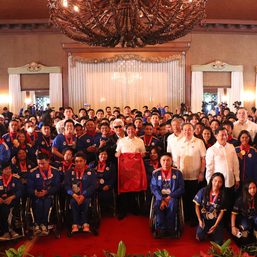SUMMARY
This is AI generated summarization, which may have errors. For context, always refer to the full article.

MANILA, Philippines – An alliance of major consumer goods firms said Thursday, April 4, that the infrastructure for managing waste should keep up with the country’s population growth.
In a media interview, Philippine Alliance for Recycling and Materials Sustainability (PARMS) founding president Crispian Lao said the rehabilitation of Manila Bay showed that gap, despite the government infrastructure push through its Build, Build, Build program.
“The wastewater is a bigger challenge. But the solid waste, you can pick it up. You can dredge it. But again, it shows there’s still a big gap for the infrastructure that needs to be built,” Lao said.
“While we’re doing Build, Build, Build, we can’t catch up with the infrastructure with the growing population of the Philippines,” he added. (READ: Why can’t the Philippines solve its trash problem?)
Data from the National Solid Waste Management Commission (NSWMC) showed that in 2012, the Philippines produced 37,427.46 tons of waste for a population of close to 93 million. In 2016, it increased to 40,087.45 tons, for more than 100 million Filipinos.
In Metro Manila alone, the biggest contributor to waste generation in the country, the figure is at 9,212.92 tons in 2016, with an estimated population of 12.88 million.
Under Republic Act Number 9003 or the “Ecological Solid Waste Management Act of 2000,” it devolved collection, transport, and disposal of solid waste to the local government units (LGUs). It also has provisions for reducing solid wastes before disposal to facilities.
The law also created NSWMC, headed by the Department of Environment and Natural Resources. The NSWMC includes heads of 13 other government agencies and 3 representatives from the private sector. Lao is a sitting member of the NSWMC for the private sector.
Lao acknowledged that a big part of the gap in materials recovery facilities (MRF) is funding, given that it was a devolved function to the LGUs.
“It boils down to the priorities of the local governments. Some local governments do not have the money. Some has the money but do not have anywhere to put up the MRF, especially in the urban setting,” Lao said.
“The government doesn’t really have the funds to put up the infrastructure. That’s a given. Then why not establish the enabling environment so that in private sector investments on the infrastructure that is needed, is brought in,” he added.
Lao also said the government should study the technologies employed in developed countries, such as Japan, Singapore, or those in Europe.
“Why are they clean? They have the infrastructure. We have to open our eyes to technology. But we have to ensure that whatever technology comes into the Philippines, it needs to be environmentally compliant and up to global standards,” Lao said.
Industry’s role
Lao said that the private sector is “prepared” to do its role in solving the trash problem.
“Industry is prepared to do its role. We are not against an extended producers responsibility but we need to put up a system that is applicable to local conditions,” Lao said.
The PARMS founding president noted that banning some materials from production, such as plastics, is an option, “but may not be the absolute solution.” (READ: Stopping our plastic waste problem ‘at the source’)
Lao said that bans on certain materials will necessitate replacements or alternatives. “We have seen already that we have banned certain materials and unfortunately some of those materials are recyclables. You ended up having more waste that have to be put for disposal,” he added
PARMS’ partners include big consumer brands such as P&G, Unilever, Universal Robina, Nestle, Coca-Cola, Monde Nissin, and Pepsi-Cola Products Philippines, among others.
He also mentioned “those who benefit” from an existing condition should be secured, such as pickers who get recyclables from trash and eventually sell these to junk shops.
“If we put up a deposit system, we have to consider as to whether are we not taking these materials out of those who depend on it for their livelihood,” Lao said.
“It has to be viewed in a broader scale, in a holistic scale, and ensure that those that may be affected by a policy are taken care of,” he explained. – Rappler.com
Add a comment
How does this make you feel?





There are no comments yet. Add your comment to start the conversation.